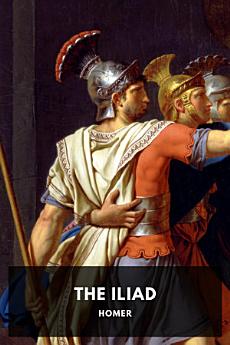The Iliad
Homer
Standard Ebooks
4.8star
8 reviewsreport
Ebook
655
Pages
family_home
Eligible
info
reportRatings and reviews aren’t verified Learn More
About this ebook
The Iliad is one of the oldest works of Western literature, dating back to classical antiquity. Homer’s epic poem belongs in a collection called the Epic Cycle, which includes the Odyssey. Written in an early literary dialect of ancient Greek, both poems were originally composed in dactylic hexameters. This meter is beautiful in the original but can sound awkward in modern English; Eric McMillan humorously described it as resembling “pumpkins rolling on a barn floor.” In the translation presented here, William Cullen Bryant avoids the problem by using iambic pentameter, a more familiar meter for verse in English.
This epic poem begins with the Achaean army sacking the city of Chryse and capturing two maidens as prizes of war. One of the maidens, Chryseis, is given to Agamemnon, the leader of the Achaeans, and the other maiden, Briseis, was given to the army’s best warrior, Achilles. Chryseis’ father, the city’s priest, prays to the god Apollo and asks for a plague on the Achaean army. To stop this plague, Agamemnon returns Chryseis to her father, but then orders Achilles to give him Briseis as compensation. Achilles refuses.
This book is part of the Standard Ebooks project, which produces free public domain ebooks.
Ratings and reviews
4.8
8 reviews
Rate this ebook
Tell us what you think.
Reading information
Smartphones and tablets
Install the Google Play Books app for Android and iPad/iPhone. It syncs automatically with your account and allows you to read online or offline wherever you are.
Laptops and computers
You can listen to audiobooks purchased on Google Play using your computer's web browser.
eReaders and other devices
To read on e-ink devices like Kobo eReaders, you'll need to download a file and transfer it to your device. Follow the detailed Help Center instructions to transfer the files to supported eReaders.







